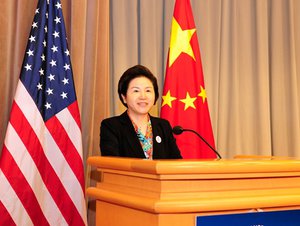ACWF VP Meng Emphasizes Women's Economic Empowerment
 |
|
Meng Xiaosi, vice-president and member of the Secretariat of the All-China Women's Federation, delivers a keynote speech at the seventh China-U.S. Women's Leadership Exchange and Dialogue held in Washington, D.C. on June 23. [Women of China/Fan Wenjun] |
Meng Xiaosi, vice-president of the All-China Women's Federation (ACWF), emphasized the importance of women's economic empowerment in her keynote speech at the 7th China-U.S. Women's Leadership Exchange and Dialogue (WLEAD), held in Washington D.C. on June 23.
As part of the China-U.S. cultural and educational exchanges, the WLEAD functions as a key bridge and bond to promote exchange and cooperation among women between the two countries, said Meng, who is also a member of the ACWF's Secretariat.
During the past four years, women and women's organizations from both countries have carried out broad cooperation in women's employment, charity, science and technology, education, health and domestic violence and have achieved remarkable results, noted Meng.
As the daylong 7th China-U.S. WLEAD focused on women's economic empowerment and women's entrepreneurship, Meng further addressed these two issues in her speech.
Meng stated that women's economic empowerment plays an important role in promoting women's progress and constitutes the fundamental condition for women to gain independence and freedom.
However, poverty is still a serious issue around the world, while women's poverty and discrimination against women interact as both cause and effect due to shortages of and unequal access to resources, infrastructure, development opportunities and services, said Meng.
Poverty not only aggravates women's economic dependence but also increases their risk of being afflicted by violence, abduction and trafficking, and labor exploitation. As women make up the majority of the impoverished population, women's economic empowerment is of great significance to global poverty alleviation and is of great necessity to women's development, she added.
In addition, women's economic empowerment is an important method and channel through which to realize the economy's inclusive growth and sustainable development. Although there has been an increase in leading businesswomen in China, the U.S., and many other countries, most women in the workplace still face glass ceilings and walls, said Meng.
Female entrepreneurs are outstanding representatives of businesswomen, and their achievements have reflected women's desire for development, aspiration and equality, she said.
Meng further cited the 2012 data showing that women who started businesses accounted for 11 percent of the entire self-employed Chinese population aged 18–64; with female entrepreneurs accounting for 25 percent of all Chinese entrepreneurs; and women who started businesses online for 55 percent.
Modern women are using their wisdom and hard work to break down long-existing gender inequality between men and women, to carve out their business careers and to open a new, unprecedented chapter in the history of women's development, noted Wang.
She stated that the ACWF has always attached importance to women's economic empowerment, including entrepreneurship and employment; the ACWF has established 8,100 venture bases for female college students, has distributed over 222 billion yuan (U.S. $36 billion) in interest-free small loans for women to start businesses and has established more than 5,000 women's hand-knitting bases.
Recently, the ACWF launched a program to encourage entrepreneurship and innovation among rural and urban women across the country through guiding them to take advantage of the new trend of "Internet Plus" (the integration of the Internet and traditional industries through online platforms and IT), pointed out Meng.
She stressed that the stable development of ties between China and the U.S. — as the world's two large economies — not only is in line with the interests of both countries but is also conductive to global stability and prosperity.
The exchange and cooperation between Chinese and American women, including women entrepreneurs, will contribute to the economic development and cultural exchange of the two countries and will help to advance women's economic empowerment around the world, said Meng.
She added that the WLEAD has clearly reflected the shared vision of women from both countries. The English word "women" starts with "w," which coincidentally is the beginning of the question words, such as "what," "why," "when," "where," "who" and "which." For thousands of years, these questions have been defined and answered by men; but a new era has been ushered in — one in which women both pose the questions and answer them.
She continued that in China, "putting family in order, administering a country and making peace with the world" have been the route people have had to take during their personal development and leadership development while, for thousands of years, men have worked to support the family while women have stayed at home to manage the household. Women have always been good housekeepers, and thus their social-leadership competencies have gone ignored and debased. However, the era of change has come.
"During the past four years," said Meng, "Chinese and American women have worked together and made progress in women's economic empowerment and will make persistent efforts to fight for a brighter future for women of both countries and women around the world."
Please understand that womenofchina.cn,a non-profit, information-communication website, cannot reach every writer before using articles and images. For copyright issues, please contact us by emailing: website@womenofchina.cn. The articles published and opinions expressed on this website represent the opinions of writers and are not necessarily shared by womenofchina.cn.

 京公网安备 11010102004314号
京公网安备 11010102004314号